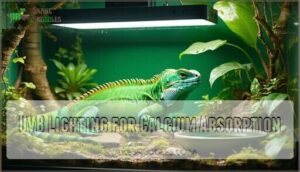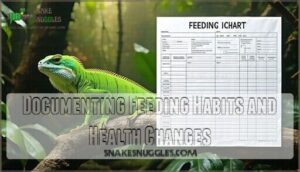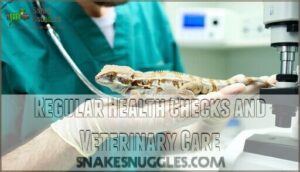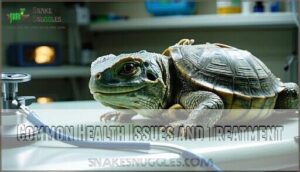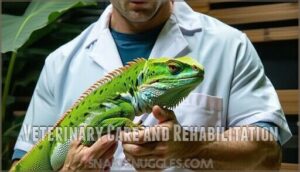This site is supported by our readers. We may earn a commission, at no cost to you, if you purchase through links.
 Proper reptile health care advice starts with three fundamentals: nutrition, environment, and monitoring.
Proper reptile health care advice starts with three fundamentals: nutrition, environment, and monitoring.
You’ll need species-appropriate diets with calcium and vitamin D3 supplements, since metabolic bone disease affects countless reptiles.
Temperature gradients let your pet thermoregulate naturally—think warm basking spots and cooler retreat areas.
UVB lighting isn’t optional; it’s essential for calcium absorption.
Monitor humidity levels religiously, as respiratory infections love improper moisture.
Watch for behavioral changes like lethargy or appetite loss, which often signal trouble before physical symptoms appear.
Regular weight tracking catches problems early.
Most importantly, find an exotic veterinarian before you need one—emergency reptile care can be tricky to locate.
Understanding these basics prevents most common health issues that plague reptile owners.
Table Of Contents
- Key Takeaways
- Nutrition and Dietary Essentials
- Creating a Suitable Environment
- Health Monitoring and Preventive Care
- Common Health Issues and Treatment
- Veterinary Care and Rehabilitation
- Frequently Asked Questions (FAQs)
- Do Reptiles need medical attention?
- Do reptiles have health issues?
- How do you care for a reptile?
- Why do Reptiles need a veterinarian?
- Do you need a reptile vet?
- How do I choose a veterinarian for my reptile?
- How to keep reptiles healthy?
- What are the signs of ill health to look for when obtaining a reptile?
- What is the most common disease in reptiles?
- How often should reptiles go to the vet?
- Conclusion
Key Takeaways
- Set up proper temperature gradients and UVB lighting – You’ll need warm basking spots, cool retreat areas, and quality UVB bulbs for calcium absorption to prevent metabolic bone disease.
- Provide species-appropriate nutrition with calcium supplements – Feed your reptile the right balance of proteins, vitamins, and minerals while dusting food with calcium and vitamin D3 to avoid nutritional deficiencies.
- Monitor humidity levels and watch for behavioral changes – Keep humidity at species-specific levels and track your pet’s weight, appetite, and activity since these changes often signal health problems before physical symptoms appear.
- Find an exotic veterinarian before you need one – Locate a reptile specialist for annual checkups and emergency care, as early professional intervention prevents minor issues from becoming serious health problems.
Nutrition and Dietary Essentials
Your reptile’s diet forms the foundation of their health, making proper nutrition essential for preventing disease and ensuring longevity.
Getting the balance right between proteins, vitamins, and minerals can mean the difference between a thriving pet and costly veterinary visits.
Protein-Rich Foods for Carnivores
Feed your carnivorous reptile a variety of protein-rich foods to guarantee optimal health.
Dubia roaches provide 35-50% protein and make excellent insect-based staples.
Whole prey like mice offer complete nutrition with 54-65% protein content.
Silkworms contain 63% protein with ideal calcium ratios.
Mix rodent foods, egg supplements, and various feeders for balanced carnivore diets and thorough reptile nutrition.
For proper reptile care, understanding reptile dietary needs is essential to prevent health issues.
Importance of Calcium and Vitamin D3
Calcium and vitamin D3 work together like a perfectly synchronized dance in your reptile’s body.
Without adequate calcium, your pet faces serious metabolic disorders that can cripple their bone health permanently.
- Calcium absorption requires vitamin D3 to function properly in reptiles
- Metabolic bone disease develops when calcium deficiency occurs over time
- Nutrient balance between calcium and phosphorus should maintain a 1:1 to 2:1 ratio
- Reptile vitamin supplements become necessary when natural sunlight exposure is limited
Omega-3 Fatty Acids for Overall Health
Beyond basic nutrition, omega-3 fatty acids from fish oil supplements serve as your reptile’s secret weapon for superior brain health and immune function.
These essential fats prevent omega-3 deficiency while supporting cardiovascular wellness.
Aquatic food sources like salmon provide natural fatty acid balance, but reptile dietary supplements guarantee consistent intake when whole prey isn’t available in your reptile nutrition guide.
Balancing Commercial Diets With Fresh Foods
While commercial diets provide convenience, they shouldn’t replace fresh foods entirely.
You’ll need to supplement pellets with species-appropriate fresh ingredients to achieve proper dietary balance.
Fresh food supplements like leafy greens, vegetables, and protein-rich foods enhance nutrient mixing and prevent deficiencies.
Smart meal planning involves feed rotation between commercial and fresh options, ensuring your reptile receives complete nutrition through varied sources.
Species-Specific Dietary Needs
Different reptile species require vastly different nutritional approaches.
Carnivore nutrition demands 30-50% protein from whole prey like mice and insects, while herbivore needs focus on 20-35% dietary fiber from leafy greens.
Insectivore diets emphasize protein-rich foods like dubia roaches, and omnivores need balanced animal-plant combinations.
Dietary supplements guarantee proper nutrient balance and mineral balance across all species-specific diet requirements.
A well-planned reptile nutrition plan is vital for maintaining the overall health and well-being of reptiles, and a balanced diet is essential for their care.
Creating a Suitable Environment
Your reptile’s enclosure isn’t just a home—it’s their entire world, and getting the environment right makes the difference between a thriving pet and a struggling one.
Creating the perfect habitat means balancing temperature gradients, lighting, humidity, space, and natural elements to match your reptile’s specific needs, which is crucial for their well-being and can be considered a complete concept in reptile care.
Temperature Gradients for Thermoregulation
Your reptile’s body temperature depends entirely on its environment, making proper thermal zones non-negotiable for health.
Temperature gradients create warm and cool areas within the enclosure, allowing natural thermoregulation techniques.
Heat sources like ceramic heaters or under-tank warmers establish these gradient systems. You’ll need consistent temperature control with thermostats to maintain ideal thermal regulation throughout the day.
To achieve this, understanding the ideal temperature gradient requirements for your reptile’s specific needs is vital.
UVB Lighting for Calcium Absorption
UVB lighting types match species requirements – desert reptiles need 10.0 bulbs while forest species use 5.0.
Proper lighting schedules support calcium metabolism through vitamin D3 synthesis. Position bulbs within 12 inches of basking spots and replace every 6-12 months for effective UVB dosage.
Understanding UVB lighting is vital for reptile health.
- Lighting distance matters: Place UVB bulbs 6-12 inches from basking areas
- Schedule consistency: Provide 10-12 hours daily UVB exposure for ideal health
- Species-specific selection: Choose 10.0 bulbs for desert species, 5.0 for forest dwellers
- Regular replacement: Replace bulbs every 6 months to maintain proper UVB output
Humidity Levels for Species-Specific Needs
Getting humidity right isn’t guesswork—it’s science. You’ll need to match your reptile’s natural habitat for ideal health.
Desert species thrive in 30-40% humidity, while tropical reptiles require 70-80%. Monitor levels daily using digital hygrometers and adjust with misters or dehumidifiers for precise environmental control.
| Species Type | Humidity Range | Hydration Method |
|---|---|---|
| Desert Reptiles | 30-40% | Water bowls, occasional misting |
| Temperate Species | 50-60% | Regular misting, humid hides |
| Tropical Reptiles | 70-80% | Daily misting, large water features |
| Semi-Aquatic | 80-90% | Substrate moisture, frequent spraying |
Enclosure Size and Ventilation
Adequate space isn’t just about size—it’s about creating the right environment.
Your reptile’s enclosure should provide room for natural behaviors while maintaining proper Air Quality through effective Ventilation Systems.
Essential Enclosure Design considerations include:
- Space Requirements: Minimum 40 gallons for small species, scaling up proportionally
- Temperature Control: Strategic vent placement prevents hot spots and cold drafts
- Airflow management: Fans positioned to circulate air without creating stress-inducing turbulence
Poor ventilation leads to respiratory infections faster than you’d think.
Proper reptile enclosures require careful planning of reptile housing to guarantee a healthy environment.
Natural Elements for Stress Reduction
Creating a stress-free environment starts with providing climbing structures and hiding spots that mimic your reptile’s natural habitat.
Visual barriers and environmental enrichment through varied textures, plants, and sensory stimulation help reduce anxiety.
These natural elements work alongside proper humidity control and temperature gradients to create a comfortable space where your reptile can exhibit natural behaviors and thrive.
Health Monitoring and Preventive Care
You can catch health problems early by watching your reptile’s weight, behavior, and eating habits regularly.
Keeping detailed records helps you spot changes that might signal illness before they become serious issues, which is a key part of monitoring their health.
Tracking Weight and Behavior
Your reptile’s weight and behavior patterns reveal health changes before symptoms appear.
Weekly Weight Monitoring using a digital scale tracks Growth Patterns, while daily Reptile Observation notes activity levels, appetite, and posture.
Behavioral Signs like lethargy or aggression signal problems early, and Consistent Health Tracking through reptile care diaries creates baselines for comparison.
Regular reptile health checks catch issues fast.
Documenting Feeding Habits and Health Changes
Keep detailed feeding records and health logs to spot patterns before problems develop.
Track what your reptile eats, when they eat, and any changes in appetite or behavior.
Simple care schedules help you maintain consistent dietary tracking, and your nutrition journals become invaluable tools for veterinary visits, showing trends that might indicate health issues brewing beneath the surface, which can be crucial for identifying potential health issues.
Preventing Health Issues Through Nutrition and Hygiene
While proper nutrition forms your reptile’s foundation for health, combining it with solid hygiene practices creates an unbeatable defense against common ailments.
This one-two punch approach maximizes health optimization through preventive care strategies.
- Nutrient Balance: Maintain calcium-to-phosphorus ratios between 1:1 and 2:1 to prevent metabolic bone disease
- Fresh Foods: Rotate seasonal vegetables and gut-loaded insects to provide diverse nutritional profiles
- Hygiene Practices: Clean enclosures weekly and disinfect food bowls after each meal
- Dietary Supplements: Use species-specific vitamins and minerals to fill nutritional gaps in commercial diets
- Health Optimization: Monitor body condition scores and adjust feeding schedules based on activity levels
Regular Health Checks and Veterinary Care
Annual veterinary visits form the backbone of reptile health care, with most reptiles requiring checkups every 12 months.
Your vet will conduct thorough reptile exams including physical assessments, blood work, and fecal testing to catch issues early.
Professional health monitoring detects problems you might miss at home, and these preventive measures and medical treatments substantially improve your pet’s longevity and quality of life.
Home Health Checks and Monitoring
Everyone benefits from consistent home health checks that catch issues before they become serious problems.
Regular Weight Tracking and Health Monitoring through Behavior Observation help you spot changes early.
Focus on these key areas:
- Skin Inspection for unusual bumps, cuts, or shedding problems
- Check eyes and mouth for discharge or swelling
- Monitor appetite and bathroom habits closely
- Watch for changes in activity levels or hiding behavior
These simple Hygiene Checks and preventive care routines keep your reptile healthy between vet visits.
Common Health Issues and Treatment
Even the most well-cared-for reptiles can develop health problems, but recognizing the warning signs early makes all the difference.
Understanding common conditions like metabolic bone disease, respiratory infections, and parasites helps you provide better care and know when it’s time to call your vet.
Heart and Blood Vessel Disorders
Understanding heart and blood vessel disorders helps you protect your reptile’s cardiovascular health.
Poor diet and infections can trigger these serious conditions that affect your pet’s circulation and organ function.
| Risk Factor | Warning Signs | Prevention Strategy |
|---|---|---|
| Dietary Impact | Lethargy, pale coloration | Balanced nutrition with proper calcium ratios |
| Genetic Predisposition | Irregular breathing patterns | Research breed-specific cardiac vulnerabilities |
| Infection Risks | Swelling, loss of appetite | Maintain clean enclosure and proper temperatures |
| Early Detection | Behavioral changes, weakness | Regular weight monitoring and activity observation |
| Treatment Options | Depends on diagnosis | Immediate reptile veterinary care consultation |
Reptile cardiac disease requires specialized diagnosis since symptoms often mirror other reptile health issues.
Your veterinarian will use diagnostic tools to differentiate heart and blood vessel disorders from respiratory or digestive problems.
Treatment depends on the underlying cause, whether it’s nutritional deficiency, bacterial infection, or genetic factors affecting your reptile’s cardiovascular system.
Digestive and Respiratory Infections
Why do respiratory and digestive problems plague reptiles so frequently? Poor habitat conditions create the perfect storm for Bacterial Pneumonia and Fungal Infections in your pet’s lungs.
Meanwhile, Impaction Causes and Parasitic Worms wreak havoc on digestive systems. Watch for Regurgitation Issues and labored breathing—these red flags signal trouble.
Maintaining proper temperature, humidity, and cleanliness prevents most respiratory infections and digestive disorders through effective infection control. Addressing these issues may require antibiotic or antifungal medications.
Reproductive Issues and Skin Infections
Beyond respiratory problems, reproductive issues pose serious threats to your reptile’s health.
Egg binding occurs when females can’t expel eggs naturally, while dystocia causes complicated births requiring immediate veterinary intervention.
Skin infections like scale rot and abscesses need prompt treatment to prevent spreading.
- Egg Binding: Monitor gravid females for signs of distress, lethargy, or prolonged egg-laying attempts
- Dystocia Causes: Poor nutrition, inadequate nesting sites, or calcium deficiency trigger difficult births
- Shedding Problems: Incomplete sheds create infection sites; maintain proper humidity levels consistently
- Scale Rot: Wet, unsanitary conditions cause bacterial infections requiring antibiotic treatment
Metabolic Bone Disease and Treatment
Metabolic bone disease strikes when calcium deficiency meets poor husbandry.
You’ll spot swollen limbs, bowed legs, or "rubber jaw" as bones soften from inadequate calcium absorption.
Early intervention reverses mild cases through immediate dietary correction and UVB lighting upgrades.
| MBD Prevention | Treatment Approach |
|---|---|
| Calcium supplements dusted on food | Veterinary calcium injections |
| UVB bulb replacement every 6 months | Oral liquid calcium therapy |
| Calcium-to-phosphorus ratio 2:1 | Fracture splinting if needed |
| Gut-loaded feeder insects | Pain management protocols |
| Proper enclosure temperatures | Physical therapy support |
Vitamin D3 synthesis requires quality UVB exposure – those cheap bulbs won’t cut it.
Monitor dietary phosphorus levels in commercial foods, as excess phosphorus blocks calcium uptake.
Supplementation strategies should target species-specific needs, with juvenile reptiles requiring more frequent calcium dusting.
MBD reversal depends on catching symptoms early before permanent skeletal damage occurs.
Parasitic Infestations and Zoonotic Diseases
Parasites can turn your reptile’s world upside down, affecting both internal organs and external skin.
Hidden parasites silently sabotage your reptile’s health from within and without.
Internal parasites like worms and protozoa weaken your pet from within, while external parasites such as mites create visible irritation.
Proper hygiene protocols and infection control measures protect both you and your reptile from zoonotic diseases, including salmonella risk.
- Microscopic enemies lurking in fecal samples under veterinary examination
- Tiny mites crawling across scales like unwanted hitchhikers
- Clean hands washing thoroughly after every reptile interaction
- Quarantine tanks isolating new arrivals from established pets
- Regular veterinary screenings catching problems before symptoms appear
Veterinary Care and Rehabilitation
When your reptile faces health challenges, finding the right veterinary care can mean the difference between recovery and prolonged suffering.
Professional rehabilitation combines expert diagnosis with targeted treatment plans that address your pet’s specific needs and support their journey back to peak health.
Choosing a Reptile-Specialized Veterinarian
Finding the right reptile veterinarian can make all the difference in your pet’s health outcomes.
Look for vets with specific reptile expertise and clinic experience treating your species. Check their qualifications through the Association of Reptile and Amphibian Veterinarians directory.
Ask about emergency care availability and cost considerations upfront. A reptile-safe vet understands species-specific needs better than general practitioners, ensuring proper reptile health checks and targeted reptile veterinary advice for your scaly companion.
Owners can also consult online vet directories for more options.
Diagnostic Tools and Medications
Your reptile’s health depends on precise diagnostic tools that reveal what’s invisible to the naked eye.
Veterinary care utilizes advanced equipment to assess reptile illnesses accurately and prescribe effective treatments.
- Reptile X-rays detect bone fractures, impactions, and metabolic bone disease
- Blood analysis evaluates organ function and nutritional deficiencies
- Fecal exams identify parasites and digestive disorders
Specialized retailers offer reptile x-ray equipment for veterinary use.
Species-specific doses guarantee safe, effective reptile medication delivery for ideal home rehabilitation outcomes.
Home Care and Rehabilitation Guidelines
Following your veterinarian’s treatment plan, you’ll become your reptile’s at-home nurse. Medication adherence requires strict timing and proper dosing techniques.
Create a reptile-safe environment by adjusting temperature and humidity levels. Wound management involves gentle cleaning and monitoring healing progress.
Dietary adjustments support recovery while stress reduction through minimal handling promotes faster healing. Monitor your pet’s response to treatment daily, focusing on overall recovery.
Importance of Follow-Up Care and Monitoring
Your reptile’s recovery doesn’t end when you leave the vet’s office.
Long-term wellness requires consistent observation and regular veterinary checkups to track progress.
Watch for behavioral changes that might signal complications—appetite shifts, unusual hiding, or mobility issues.
Early detection through reptile health monitoring prevents minor setbacks from becoming major problems.
Preventative adjustments to care routines guarantee your pet stays healthy.
Managing Reptile-Associated Salmonellosis
Salmonella prevalence in reptiles poses real human risk, with captive species showing higher infection rates.
Smart hygiene practices protect your family from these common health problems.
Always follow these safe handling steps:
- Wash hands thoroughly after any reptile contact
- Use separate cleaning supplies for reptile equipment
- Disinfect surfaces with bleach solutions regularly
Proper disinfection protocols prevent transmission while maintaining excellent reptile care standards.
Frequently Asked Questions (FAQs)
Do Reptiles need medical attention?
Yes, reptiles definitely need medical attention.
You should schedule annual veterinary check-ups with reptile specialists to catch health issues early, establish baselines, and prevent common problems like infections or nutritional deficiencies.
Do reptiles have health issues?
Like a delicate ecosystem, your reptile’s health isn’t bulletproof.
They’re vulnerable to metabolic bone disease, respiratory infections, parasites, and digestive issues.
Poor temperature, humidity, or diet can trigger problems, making regular monitoring essential.
How do you care for a reptile?
Create a proper habitat with temperature gradients, UVB lighting, and correct humidity levels.
Provide species-appropriate nutrition with supplements like calcium and vitamin D3.
Monitor weight, behavior, and appearance regularly for early health issue detection.
Why do Reptiles need a veterinarian?
Your reptile’s health hangs by a thread without specialized veterinary care.
You’ll need expert diagnosis for subtle symptoms, proper treatment dosing, and preventive screenings that detect parasites, infections, and metabolic bone disease before they become life-threatening emergencies.
Do you need a reptile vet?
Absolutely.
Reptile-specific veterinarians have specialized knowledge that’s essential for your pet’s health.
They understand unique anatomy, diseases, and treatment protocols that general vets might miss, ensuring proper care when issues arise.
How do I choose a veterinarian for my reptile?
Nearly 60% of reptile owners choose vets without exotic experience, often leading to misdiagnosis.
You’ll want a veterinarian who specializes in reptiles, has proper diagnostic equipment, and understands species-specific needs for ideal care.
How to keep reptiles healthy?
You’ll need proper habitat setup with temperature gradients, UVB lighting, and species-appropriate humidity levels.
Provide balanced nutrition with calcium supplements, maintain clean enclosures, and monitor behavior regularly for early health detection.
What are the signs of ill health to look for when obtaining a reptile?
Carefully check creatures for concerning clues: cloudy eyes, labored breathing, visible parasites, abnormal posture, discharge from nose or mouth, lethargy, weight loss, skin lesions, or unusual behavior patterns before purchasing.
What is the most common disease in reptiles?
Metabolic bone disease ranks as the most common reptile ailment.
You’ll spot it through soft shells, curved spines, or difficulty moving.
It stems from calcium deficiency or inadequate UVB lighting in your pet’s habitat.
How often should reptiles go to the vet?
Like a regular health check-up keeps you on track, your reptile needs annual veterinary visits.
Schedule yearly exams to catch issues early, plus additional visits if you notice behavioral changes or health concerns.
Conclusion
Remember when you first got your reptile and worried about every little thing? You’ve come a long way.
Following solid reptile health care advice means you’re already ahead of most pet owners.
Keep monitoring those temperatures, maintain proper nutrition, and don’t skip those vet checkups.
Your scaly friend depends on your consistency more than perfection.
Trust your instincts—you know your pet better than anyone else does, and with proper care, you can ensure a healthy life for your reptile.
- https://winchestervetclinic.com/2025/03/01/reptile-care-health-tips/
- https://www.birdandexoticsvet.com/reptile-health-identifying-and-preventing-common-issues/
- https://www.dvm360.com/view/current-thoughts-reptile-nutrition-proceedings
- https://reptilinks.com/pages/the-links
- https://www.ashworthpet.com/blog/1124094-reptile-nutrition


